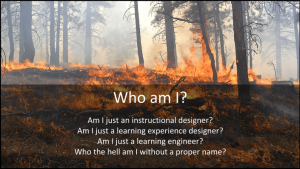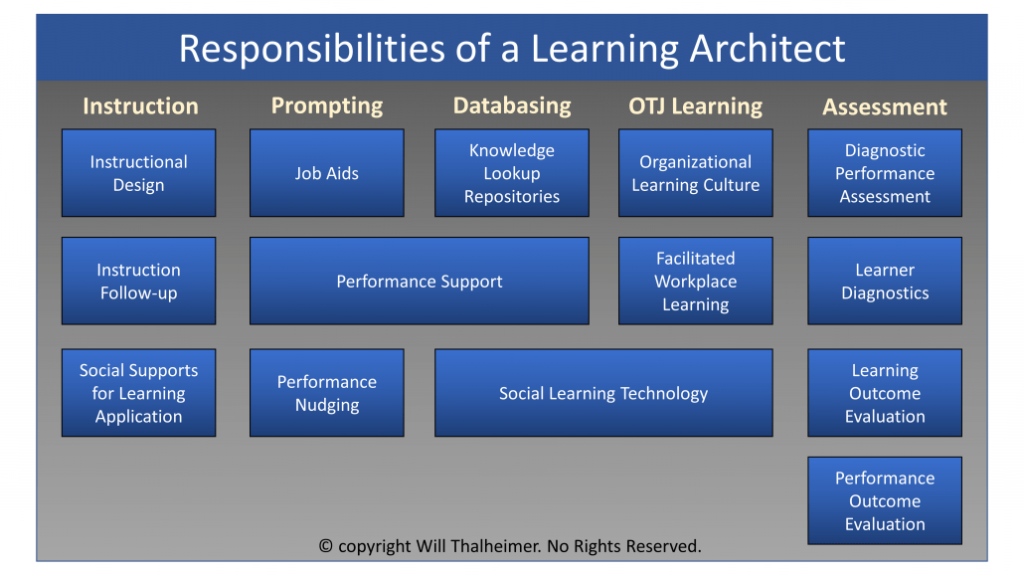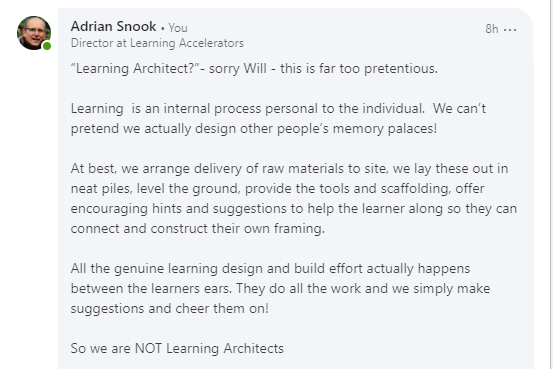
Will Thalheimer enjoys my deep respect because he is very rarely wrong. This is why I have been following his recent debate about selecting a new job title for learning professionals with special interest!
Will’s Heated Debate!

Will’s engaging and funny exploration of this subject has considered all the leading contenders for our new job title including: Instructional Designer, Learning Designer, Learning Engineer, Learning Experience Designer and finally, Learning Architect. And after weighing all these options he has now officially declared our new job title to be: Learning Architects. See: https://lnkd.in/e2ika8J
What do ‘Learning Architects’ do?
To be clear, Will is not simply saying that all the ‘artistes’ formerly known as learning or instructional designers will henceforth be Learning Architects.
Here is Will’s excellent breakdown of the very broad scope of work falling under his grand new job title:

credit: www.worklearning.com
Given the global esteem in which Will is held, no-one seems inclined to protest much about this, save for those concerned about the potential legal implications of using the word ‘Architect’.
Why we are not ‘Learning Architects’
After watching Will’s debate for a couple of weeks, it is becoming clear that the die is being cast. We are all going to become Learning Architects unless I intervene to point out some significant issues with this plan!
So I contacted Will last night to lodge this protest via LinkedIn.
In essence my LI post represents the Second Guiding Principle of Accelerated Learning, which is that Learning is creation, not consumption. In other words, knowledge is not something a learner simply accepts like an architects client, but something that they themselves need to internally frame and construct. Learning only occurs when someone integrates new knowledge, skills or behaviour into their own pre-existing structures of understanding. Which is why I said:

In truth learning professionals do not really ‘create’, ‘design’, or ‘develop’ learning itself. This notion is a useful career fiction we all live with.
The role of the learning professional is to enable, facilitate and accelerate the work of learners as they do their own creative internal ‘design and build’. The title ‘Learning Architect’ would therefore be an grandiose affectation that does not reflect these realities.
Why we are all Learning Accelerators
So – if all learning professionals are not Learning Architects, then what are we?
Before formal learning was devised all ‘learning experiences’ were accidental, taking place at the snail’s pace of daily life. Children got lost in the woods at random and found that nettles sting the hard way. If they were lucky they found their way home again afterwards, having learned valuable lessons in local geography and botany.
Formal education and training artificially accelerates the slow and unpredictable pace of learner experience. Rather than leaving things to chance we create structured programmes of activities and thinking exercises. We offer useful models, tools, and resources, provide a safe space and scaffolding so our learners can work safely and with confidence. Whilst they are working to build their adapted model of the world we offer them advice and encouragement to prevent them becoming disheartened.
Modern learning professionals are able to draw on vast array of powerful resources and technologies. We pack rich, engaging activities tightly together, compressing experiences to support the learner in internalising new attitudes, knowledge and skills in hours, days, weeks or months rather than years or decades.
So all all learning professionals are therefore truly worthy of the title Learning Accelerator.